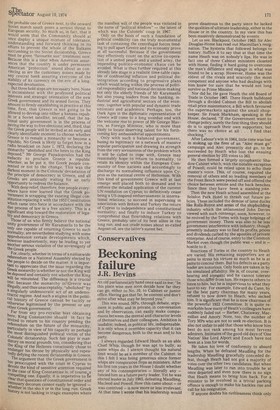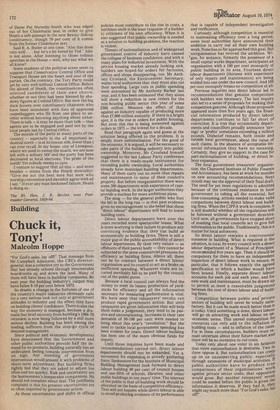Beckoning failure
J.R. Bevins
An old parliamentary hand once said to me-;-"In this place wise men soon decide how far they can go, either to No. 10, to Cabinet or junior office. Having got that far, be content and don't strive after what may be beyond you."
This was sound. MPs, through debate, argument in public and in private, in conversation and by observation, can easily make comparisons between the mental and character levels of themselves and their colleagues. Ambition is laudable; indeed, in political life, indispensable. It is only when it overrides capacity that it can become dangerous, both to the man and.to his party.
I always regarded Edward Heath as an able Chief Whip, though he was apt to bully, as some whips do. I always thought his natural limit would be as a member of the Cabinet: in this I felt I was being generous since former whips are conspicuous flops as ministers. After his first ten years in the House I doubt whether any of his contemporaries — literally any — fancied him as a future party leader. Yet he was elected leader in July 1965, defeating Maudling, Macleod and Powell. How this came about — or was contrived — is now more or less irrelevant. At that time I wrote that his leadership would prove disastrous to the party since he lacked the qualities of ultimate leadership, either in the House or in the country. In my view this has been massively demonstrated by events.
Let us see. Blackpool, October 1963. Sir Alec Douglas-Home has read out Macmillan's resig nation. The hysteria that followed belongs to history. Suffice it to say that at that time the name Heath was on nobody's lips. He was in fact one of three Cabinet ministers closeted with Home, finding it hard going to overcome the man's diffidence and engage in what was bound to be a scrap. However, Home was the eldest of the rivals and scarcely the most competent and anyone who had dealings with him knew for sure that he would not long survive as Prime Minister.
Nor did he. He gave Heath the old Board of Trade in October 1963. There Heath bulldozed through a divided Cabinet the Bill to abolish retail price maintenance, a Bill which favoured the supermarkets against the small shop keeper. Sir Frank Markham, speaking in the House, declared, "If the Government want to change policy, surely the first thing they should do is to approach their own supporters, but there was no choice at all . . I find that shocking."
After Labour's win in 1964, little time was lost in stoking up the fires of an "Alec must go" campaign and Alec presently did go, to be succeeded by Heath who lost the ensuing general election by 253 votes to 363.
He then formed a largely sycophantic Shadow Cabinet which, with the notable exception of Powell, could be relied upon to echo their master's voice. This, of course, required the removal of others and so leading members of the Front Bench were peeled off and offered the choice between ermine and the back benches. Since then they have been a standing joke.
Then the new Heath school assembled at the Selsdon Park Hotel to thrash out future po licies. These included the demise of lame ducks like Rolls-Royce and areas of the shipbuilding industry which the unlamented John Davies viewed with such contempt, soon, however, to be revived by the Tories with huge helpings of government money. There was also to be less government interference with industry, though presently industry was to find its profits, prices and dividends curbed by the apostles of private enterprise. And of course, entry to the Common Market even though the public was — and is — hostile to it.
Reactions of Tories in the country to Heath are varied. His remaining supporters are at pains to stress his virtues as much as he is at pains to conceal them. But his defects as a party leader are notorious. Only fools are taken in by his simulated affability. He is, of course, over bearing and arrogant and he cannot tolerate those who differ from him. He expects others to listen to him, but he is impervious to what they have to say. For example, Edward du Cann, by far the best party chairman for many years, refused to bow down to Heath, who sacked him. It is significant that he is now chairman of the powerful 1922 Committee. It is quite re markable how many of Heath's colleagues have suddenly faded out — Barber, Chataway, Macmillan and Amory. Note, too, the number of Tory MPs who are not to seek re-election. It is also not unfair to add that those who know him best do not rank among his most fervent admirers. Intimates of the good old days of 'One Nation' like Lord Alport and Enoch have not been at a loss for words.
He takes his love of conformity to absurd lengths. When he defeated Maudling for the leadership Maudling gracefully conceded de feat, though Heath had not got a majority of votes over the other two candidates. But when Maudling was later to run into trouble he at once departed and even now there is no sign that Heath means to bring. him back. For a minister to be involved in a trivial parking offence is enough to make his hackles rise and call for his resignation.
If anyone doubts his ruthlessness think only of Dame Pat Hornsby-Smith who was edged out of her Chislehurst seat in order to give Heath a safe passage in the new Bexley-Sidcup constituency, though 70 per cent of it comes from the former Chislehurst seat.
Said R. A. Butler at one time: "Alec has done very well. . . but he's a bit bored by Ted." Alec is not alone. After listening to those tedious speeches in the House — well, why say what we all know?
Some students of the political scene seem to suppose that Conservative Central Office and Transport House are the heart and soul of the parties. On.the contrary, the Tory Party could get by very well without Central Office. Before the advent of Heath, the constituencies often selected candidates of their own choice, whether or not they had been blessed by shadowy figures at Central Office. But now the big stick hovers over constituency chairmen who have been inundated with lists of approvedcarpetbaggers who flit from one place to another without knowing anything about either. There is talk — it may be more than talk — that agents are to be engaged and paid not by the local people but by Central Office. The morale of the party in many parts of the country — especially in the all important industrial north — is at its lowest ebb, lower than I can ever recall. In my home city of Liverpool, where we used to sweep the board, we are now left with a solitary MP and the party has been decimated at local elections. The pride of the north! Yet nobody seems to care.
I venture to suggest that all this — and more besides — stems from the Heath mentality: "Give me not the best men but men who worship convention and slavishly agree with all I say." If ever any man beckoned failure, Heath is doing so.
The Rt. Hon. J. R. Bevins was Postmaster-General, 1959-64.

































 Previous page
Previous page